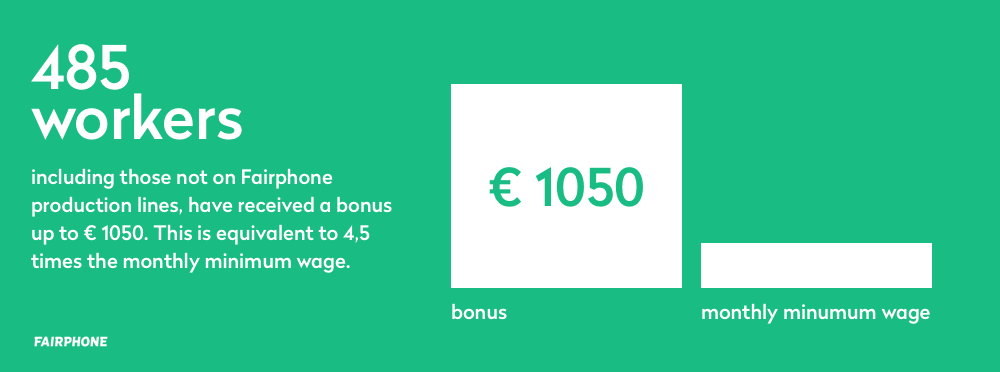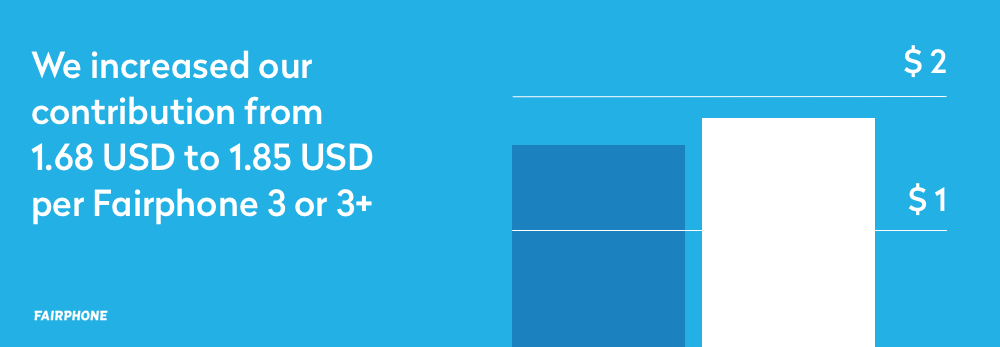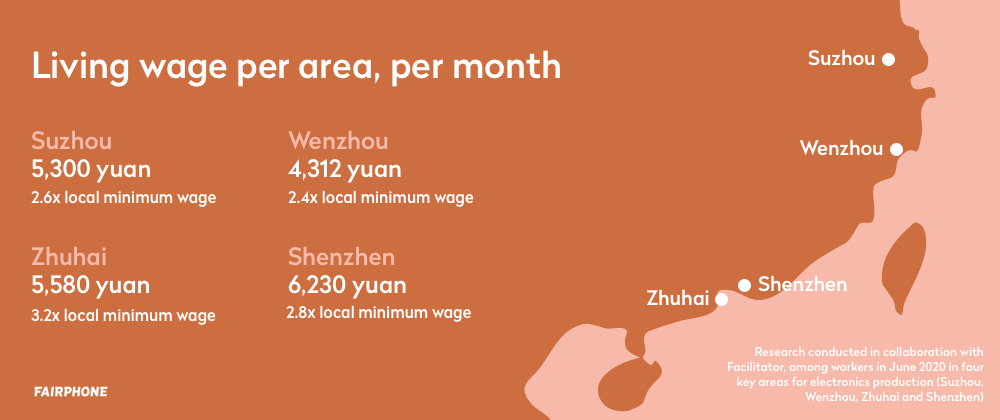Paying living wage in the electronic supply chain
For many of us, December is a time where we have to watch our wallets and budget carefully – especially this year, as COVID-19 wreaks havoc on the global economy. But for many more people, this is a year-round concern, regardless of the coronavirus.
Low wages are a persistent problem for workers in multiple sectors of the electronics industry. Many workers (and subsequently, their families) struggle to access food, education, healthcare, housing and other essentials, simply because they are not receiving a fair, living wage. A living wage is one that affords a basic but decent standard of living to the worker and their family.
Fairphone is the first electronics company that pays a living wage bonus to factory workers at our supplier Arima.
Fairphone pays factory workers a bonus of $1.85 USD per Fairphone 3 and 3+ produced. The unique system is part of Fairphone’s ongoing work to improve worker welfare in our supply chain and is paid on top of the regular salary to fill the gap between the Chinese minimum wage and a living wage.

We started this in September 2019. In just over a year, more than 485 workers, including those not on Fairphone production lines, have received a bonus up to EUR1,050. This equals more than 4 months of extra salary, or in other words, a salary increase of 30% if you earn the legal minimum wage. By paying living wages we also address one of the root causes of excessive overtime, another systemic industry problem.
We’ve been regularly checking in with workers at the factory to receive their feedback on the program, and have made some practical changes in July 2020:

- We now pay out the bonus on monthly basis, rather than quarterly
- The lowest-earning workers get a higher bonus
- It’s no longer required to have worked 3 months or more at the factory to get the bonus
- Making space for regular discussion and employee surveys was key for implementing these worker-recommended changes – as is understanding the wider cultural context.
The legal minimum wage is not a living wage
With the ongoing Covid-19 pandemic, research done in collaboration with Facilitator, a Chinese NGO, found that a living wage is more important than ever, as most workers experience a loss of income, mainly due to less overtime work and lower employer revenue. During the peak of the Covid crisis in China, Fairphone has also paid the living wage bonus to some factory workers in February and March 2020 who were unable to go to the factory due to government travel restrictions – helping to support them during a challenging time.
The Facilitator research further found that the living wages in China are 2.5 to 3 times the legal minimum wage. The survey found that most workers first cut food expenses, followed by housing, medical and education expenses if their income is too low for a decent living standard. The research also confirmed a new trend. In the past, parents left their children in their home towns with their grandparents while they traveled thousands of kilometers to the factories for work. Now, more and more Chinese migrant workers move to cities along with their children and grandparents. This means that workers need an even higher income to afford the cost of living in a city with their families. To calculate the living wage for four key electronics production regions in China, Facilitator used the Anker methodology and complemented this with actual urban family size confirmed via worker surveys.

This research doesn’t just highlight the ways “business as usual” is failing workers: it provides us with valuable insight about opportunities to make our supply chain fairer.
We are proud that we have increased the living wage bonus at a time when many companies struggled to cut costs due to the global pandemic and will not be lowered when the pandemic is over. In just over a year, we have shown that it’s possible to enable living wages for factory workers in the supply chain and that costs less than 2 EURO per smartphone. The living wage program is an example of Fairphone creating a scalable model that can be easily replicated by the rest of the industry. And if they do, it could completely transform the electronics sector and the lives of the people that work in it. It’s time for electronics companies to start paying living wages in their supply chain.
To find out more about how we calculated and initially set up the living wage bonus, read our whitepaper here >>



